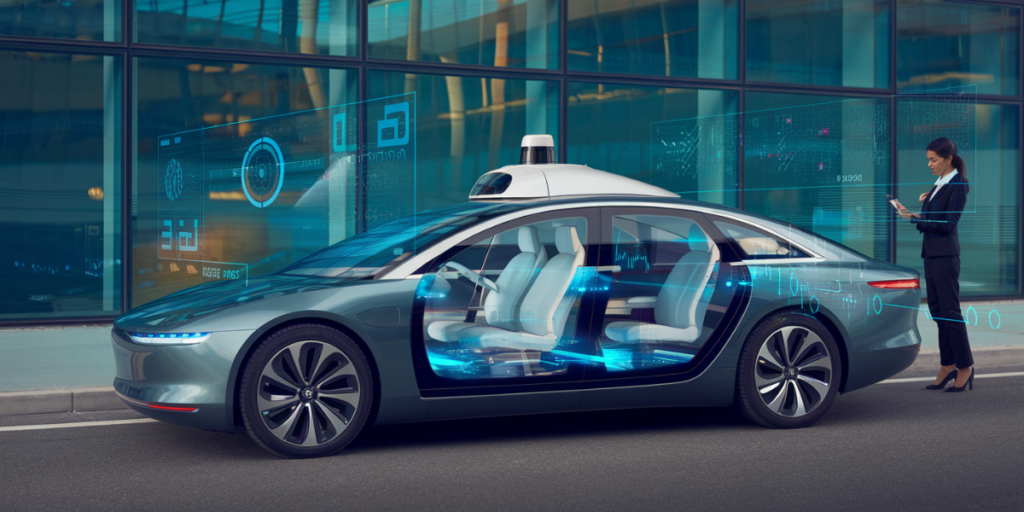and What It Means for Your Career
Autonomous vehicles (AVs) are no longer a concept reserved for science fiction. With rapid advancements in artificial intelligence, machine learning, and sensor technologies, AVs are set to transform the automotive industry. But what does this mean for professionals—particularly women—looking to advance their careers in a sector that’s historically been male-dominated? This case study explores the current state of autonomous vehicle technology, highlights its impact on the automotive industry, and outlines the skills and opportunities needed to thrive in this new landscape.
The Rise of Autonomous Vehicles: Where We Stand Today

Autonomous vehicles are designed to operate without human intervention, using a combination of sensors, cameras, and advanced algorithms to navigate their surroundings. Although fully self-driving cars (Level 5 automation) are not yet on the market, lower levels of automation (Levels 1-4) are already influencing the industry. These semi-autonomous systems include features like adaptive cruise control, lane-keeping assistance, and automated parking.
According to a report by McKinsey & Company, by 2030, up to 15% of new vehicles sold could be fully autonomous. Major automotive companies like Tesla, Waymo, and General Motors are investing heavily in AV development. As these technologies continue to evolve, professionals in the automotive industry will need to adapt, and with that comes both challenges and exciting new opportunities.
Case Study: The Transformation of Automotive Careers
Challenge: Shifting Industry Demands
When Sarah first entered the industry, her role focused on traditional mechanical engineering—designing engines, optimizing vehicle structures, and ensuring safety standards. However, with the advent of AV technology, the industry began shifting its focus towards software development, data analytics, and cybersecurity. Sarah noticed that many of her colleagues were already reskilling to work with advanced driver-assistance systems (ADAS) and vehicle-to-everything (V2X) communication technologies.
Sarah understood that to remain relevant, she needed to evolve her skill set to include expertise in the emerging areas of automotive technology.

Solution: Embracing Continuous Learning
Recognizing the need for change, Sarah enrolled in an advanced certification program in automotive software engineering. This program taught her the foundations of AI, machine learning, and sensor technology—key components of autonomous vehicles. She also took courses in data analytics to better understand how to interpret the data gathered from AV sensors and systems.
Networking played a critical role in Sarah’s career pivot. She attended conferences on autonomous vehicles and joined professional groups that discussed AV-related innovations. Through these networks, Sarah connected with mentors and industry leaders who helped guide her career trajectory.
Results: A New Career Path in Autonomous Vehicles
Sarah’s decision to upskill transformed her career. She now works on AV software integration, specializing in human-machine interface design for a leading automotive firm. Her understanding of both traditional vehicle mechanics and cutting-edge software gives her a unique competitive advantage in the evolving automotive landscape.
Sarah’s journey highlights the importance of staying flexible and proactive in the face of industry disruption. Her story serves as a blueprint for how women in automotive can navigate the shift toward autonomous vehicles and secure leadership roles in the process.
Key Trends in Autonomous Vehicles and Career Implications
Sarah’s case is just one example of how professionals can adapt to the rise of autonomous vehicles. Below are the key trends driving the AV industry and the skills needed to stay ahead.
1. Software Engineering and Data Science
As vehicles become more autonomous, they rely less on mechanical components and more on sophisticated software systems. Engineers must now have a firm grasp of software development, coding languages like Python or C++, and algorithms that enable machine learning.
Key Skills:
- Software development (Python, C++, Java)
- Data analytics and machine learning
- AI-driven decision-making processes
Professionals in this field can specialize in creating algorithms that allow autonomous vehicles to recognize objects, make real-time decisions, and safely navigate the roads.
2. Cybersecurity
Autonomous vehicles are essentially data hubs on wheels, constantly communicating with other vehicles, infrastructure, and cloud systems. This connectivity opens new vulnerabilities, making cybersecurity a critical aspect of AV technology. Ensuring that these systems are protected from hacking or unauthorized access will be a top priority.
Key Skills:
- Cybersecurity protocols
- Threat detection and mitigation
- Secure data transmission
Women with expertise in cybersecurity will find themselves in high demand, especially as AV adoption grows and the need for secure systems becomes more pressing.

3. Ethics and Regulatory Compliance
As AVs continue to develop, regulatory frameworks and ethical considerations will be at the forefront. How should AVs be programmed to make life-and-death decisions in an emergency? What kind of regulations should govern autonomous vehicles to ensure public safety?
Key Skills:
- Understanding of legal frameworks
- Ethical decision-making in AI development
- Compliance with safety and government regulations
Experts in this field will play an essential role in shaping the policies that guide AV development and deployment, ensuring that innovation is balanced with safety and public trust.
4. Human-Machine Interface (HMI) Design

In autonomous vehicles, the interaction between humans and machines is crucial, particularly in semi-autonomous systems where drivers may still need to take control. Designing intuitive and user-friendly interfaces is key to ensuring a smooth experience for drivers and passengers alike.
Key Skills:
- User experience (UX) design
- Psychology of human-computer interaction
- Ergonomics and interface design
Sarah’s career pivot to HMI is a perfect example of how professionals can leverage new opportunities in this space.
5. Project Management and Leadership in AV Development
As AV technology becomes more widespread, managing the complexity of large-scale projects—from software integration to hardware manufacturing—will be essential. Project management roles that oversee AV development will require strong organizational skills, the ability to manage cross-functional teams, and a deep understanding of the technology.
Key Skills:
- Project management (PMP certification, Agile methodology)
- Leadership in tech teams
- Knowledge of AV lifecycle development
For women aspiring to leadership roles, developing project management expertise can provide a direct path to senior positions within the AV space.
The Future Is Now: Preparing for Your AV Career
The rise of autonomous vehicles is inevitable, but with this disruption comes immense opportunity. Women in the automotive industry must be proactive in preparing for this future by investing in continuous learning, expanding their skill sets, and engaging in professional networks.
If you’re looking to secure your place in this future, here are some actionable steps to consider:
- Enroll in online courses on AI, machine learning, or automotive software engineering. Take advantage of WIA Scholarships for both Northwood University and Keiser University.
- Attend AV industry conferences to network with experts and stay updated on the latest developments.
- Join professional organizations like Women In Automotive (WIA) to connect with mentors and peers navigating similar career transitions.
- Seek certifications in cybersecurity, project management, or data science to broaden your expertise.

The future of the automotive industry is bright, and autonomous vehicles will play a central role. By staying agile and cultivating the right skills, you can carve out a rewarding career in this evolving landscape.
Autonomous vehicles are reshaping the automotive industry, bringing new challenges and creating exciting opportunities. Sarah’s case shows how professionals can thrive by adapting to these changes, and her story is just one of many. The key to success is staying informed, upskilling continuously, and leveraging the support of professional networks like WIA. Whether you’re a software engineer, a project manager, or a cybersecurity expert, the future of autonomous vehicles holds limitless potential for those ready to seize it.

